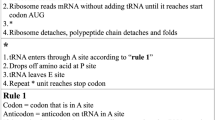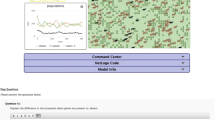Abstract
Computational thinking has often been overlooked in the K-12 settings, particularly in the Next Generation Science Standards (NGSS). In this chapter, we present a social cognitive self-regulated learning approach for infusing computational thinking into teaching settings using science and engineering practices of NGSS. Self-regulated learning related to computational thinking is viewed as a goal-directed process whereby a learner is required to identify a problem, examine relevant data to inform a solution, develop a solution, and evaluate the solution. Illustrations on how self-regulated learning cycles can become mechanisms to model and assess student computational thinking as students are engaged in science and engineering practices are provided.
Access this chapter
Tax calculation will be finalised at checkout
Purchases are for personal use only
Similar content being viewed by others
References
American Association for the Advancement of Science. (1993). Benchmarks for scientific literacy. New York, NY: Oxford University Press.
National Research Council. (1996). National science education standards. Washington, DC: National Academy Press.
Jonassen, D. H. (2000). Toward a design theory of problem solving. Educational Technology Research and Design, 48(4), 63–85.
Jones, B. F., Rasmussen, C. M., & Moffitt, M. C. (1997). Psychology in the classroom: A series on applied educational psychology. Real-life problem solving: A collaborative approach to interdisciplinary learning. Washington, DC: American Psychological Association. https://doi.org/10.1037/10266-000
De Corte, E., Mason, L., Depaepe, F., & Verschaffel, L. (2011). Self-regulation of mathematical knowledge and skills. In Handbook of self-regulation of learning and performance (pp. 155–172). New York: Routledge. https://doi.org/10.4324/9780203839010.ch10
Reschly, A. L., Huebner, E. S., Appleton, J. J., & Antaramian, S. (2008). Engagement as flourishing: The contribution of positive emotions and coping to adolescents’ engagement at school and with learning. Psychology in the Schools, 45(5), 419–431. https://doi.org/10.1002/pits.20306
National Research Council. (2012). A framework for K-12 science education: Practices, crosscutting concepts, and core ideas, Committee on a Conceptual Framework for New K- 12 Science Education Standards. Board on Science Education, Division of Behavioral and Social Sciences and Education. Washington, DC: The National Academies Press.
De Corte, E. (2011). Constructive, self-regulated, situated, and collaborative learning: An approach for the acquisition of adaptive competence. The Journal of Education, 192(2/3), 33–47. https://doi.org/10.1177/0022057412192002-307
Rich, P. J., & Hodges, C. B. (2017). Emerging research, practice, and policy on computational thinking. Cham, Switzerland: Springer.
Tatar, D., Harrison, S., Stewart, M., Frisina, C., & Musaeus, P. (2017). Proto-computational thinking: The uncomfortable underpinnings. In P. J. Rich & C. B. Hodges (Eds.), Emerging research, practice, and policy on computational thinking (pp. 63–84). Cham, Switzerland: Springer International Publishing.
Wing, J. M. (2006). A vision for the 21st century: Computational thinking. Communications of the ACM, 49(3), 33–35.
Weintrop, D., Beheshti, E., Horn, M., Orton, K., Jona, K., Trouille, L., & Wilensky, U. (2016). Defining computational thinking for mathematics and science classrooms. Journal of Science Education and Technology, 25(1), 127–147.
Aho, A. V. (2012). Computation and computational thinking. The Computer Journal, 55(7), 832–835. https://doi.org/10.1093/comjnl/bxs074
Wing, J. (2011). Research notebook: Computational thinking—What and why? The Link Magazine, Spring. Pittsburgh: Carnegie Mellon University.
Curzon, P., & McOwan, P. W. (2016). The power of computational thinking: Games, magic and puzzles to help you become a computational thinker. New Jersey: World Scientific.
Boekaerts, P. P., Pintrich, P. R., & Zeidner, M. (2000). Handbook of self-regulation (pp. 451-502). San Diego, CA: Academic.
Schunk, D. H., & Greene, J. A. (Eds.). (2018). Handbook of self-regulation of learning and performance (2nd ed.). New York, NY: Routledge.
Zimmerman, B. J. (2000). Attaining self-regulation: A social-cognitive perspective. In M. Boekaerts, P. Pintrich, & M. Zeidner (Eds.), Handbook of self-regulation (pp. 13–39). San Diego, CA: Academic Press.
Cleary, T. J., Velardi, B., & Schnaidman, B. (2017). Effects of the self-regulation empowerment program (SREP) on middle school students’ strategic skills, self-efficacy, and mathematics achievement. Journal of School Psychology, 64, 28–42.
Peters, E. E., & Kitsantas, A. (2010). Self-regulation of student epistemic thinking in science: The role of metacognitive prompts. Educational Psychology, 30(1), 27–52.
Kitsantas, A., & Zimmerman, B. J. (2009). College students’ homework and academic achievement: The mediating role of self-regulatory beliefs. Metacognition and Learning, 4(2), 97–110. https://doi.org/10.1007/s11409-008-9028-y
Cleary, T. (Ed.). (2015). School psychology series. Self-regulated learning interventions with at-risk youth: Enhancing adaptability, performance, and well-being. Washington, DC: American Psychological Association. https://doi.org/10.1037/14641-000
Kitsantas, A., & Zimmerman, B. J. (2002). Comparing self-regulatory processes among novice, non-expert, and expert volleyball players: A microanalytic study. Journal of Applied Sport Psychology, 14(2), 91–105. https://doi.org/10.1080/10413200252907761
Kolovelonis, A., Goudas, M., Dermitzaki, I., & Kitsantas, A. (2013). Self-regulated learning and performance calibration among elementary physical education students. European Journal of Psychology of Education, 28(3), 685–701. https://doi.org/10.1007/s10212-012-0135-4
Peters-Burton, E. E., & Botov, I. S. (2017). Self-regulated learning microanalysis as a tool to inform professional development delivery in real-time. Metacognition and Learning, 12(1), 45–78. https://doi.org/10.1007/s11409-016-9160-z
Peters-Burton, E. E., Cleary, T. J., & Forman, S. G. (2015). Professional development contexts that promote self-regulated learning and content learning in trainees. doi: https://doi.org/10.1037/14641-010
Denning, P. J. (2017). Remaining trouble spots with computational thinking. Communications of the ACM, 60(6), 33–39. https://doi.org/10.1145/2998438
Cleary, T. J., & Zimmerman, B. J. (2004). Self-regulation empowerment program: A school- based program to enhance self-regulated and self-motivated cycles of student learning. Psychology in the Schools, 41(5), 537–550.
Thomas, J. W., & Rohwer, W. D., Jr. (1986). Academic studying: The role of learning strategies. Educational Psychologist, 21, 19–41.
Rohrkemper, M. (1989). Self-regulated learning and academic achievement: A Vygotskian view. In B. J. Zimmerman & D. H. Schunk (Eds.), Self-regulated learning and academic achievement: Theory, research and practice (pp. 143–167). New York: Springer.
Wang, M. C., & Peverly, S. T. (1986). The self-instructive process in classroom learning contexts. Contemporary Educational Psychology, 11, 370–404.
Henderson, R. W. (1986). Self-regulated learning: Implications for the design of instructional media. Contemporary Educational Psychology, 11, 405–427.
Pape, S. J., Bell, C. V., & Yetkin-Özdemir, I. E. (2013). Sequencing components of mathematics lessons to maximize development of self-regulation: Theory, practice, and intervention. In H. Bembenutty, T. J. Cleary, & A. Kitsantas (Eds.), Applications of self-regulated learning across diverse disciplines: A tribute to Barry J. Zimmerman (pp. 29–58). Charlotte, NC: IAP Information Age Publishing.
Kitsantas, A., Zimmerman, B. J., & Cleary, T. (2000). The role of observation and emulation in the development of athletic self-regulation. Journal of Educational Psychology, 92(4), 811–817.
Kitsantas, A., & Zimmerman, B. J. (1998). Self-regulation of motoric learning: A strategic cycle view. Journal of Applied Sport Psychology, 10(2), 220–239. https://doi.org/10.1080/10413209808406390
McPherson, G. E., & Zimmerman, B. J. (2011). Self-regulation of musical learning: A social cognitive perspective on developing performance skills. In R. Colwell & P. Webster (Eds.), MENC handbook of research on music learning, volume 2: Applications (pp. 130–175). New York, NY: Oxford University Press.
Schunk, D. H., & Zimmerman, B. J. (Eds.). (1998). Self-regulated learning: From teaching to self-reflective practice. New York, NY: Guilford Press.
Grover, S., Pea, R., & Cooper, S. (2015). Designing for deeper learning in a blended computer science course for middle school students. Computer Science Education, 25(2), 199–237.
Grover, S., & Pea, R. (2013). Computational thinking in K-12: A review of the state of the field. Educational Researcher, 42, 38–43.
Yadav, A., Zhou, N., Mayfield, C., Hambrusch, S., & Korb, J. T. (2011). Introducing computational thinking in education courses. In Proceedings of the 42nd ACM technical symposium on computer science education (pp. 465–470). Dallas, TX: ACM.
Yadav, A., Mayfield, C., Zhou, N., Hambrusch, S., & Korb, J. T. (2014). Computational thinking in elementary and secondary teacher education. ACM Transactions on Computing Education (TOCE), 14(1), 5–21.
Cleary, T. J. (2011). Emergence of self-regulated learning microanalysis: Historical overview, essential features, and implications for research and practice. In B. J. Zimmerman & D. Schunk (Eds.), Handbook of self-regulation of learning and performance (pp. 329–345). New York: Routledge.
Barr, V., & Stephenson, C. (2011). Bringing computational thinking to K-12: What is involved and what is the role of the computer science education community? ACM Inroads, 2(1), 48–54.
NGSS Lead States. (2013). Next generation science standards: For states, by states. Washington, DC: Achieve.
Johnson, C. C., Walton, J., & Peters-Burton, E. E. (in press). STEM road map for elementary school: Transportation in the future. Arlington, VA: NSTA Press.
Peters, E. E. (2012). Developing content knowledge in students through explicit teaching of the nature of science: Influences of goal setting and self-monitoring. Science & Education, 21(6), 881–898. https://doi.org/10.1007/s11191-009-9219-1
White, M. C., & DiBenedetto, M. K. (2015). Self-regulation and the common core: Application to ELA standards. New York, NY: Routledge.
Cooper, S., Forbes, J., Fox, A., Hambrusch, S., Ko, A., & Simon, B. (2016). The importance of computing education research. arXiv preprint retrieved at arXiv:1604.03446.
Franklin, D. (2015). Putting the computer science in computing education research. Communications of the ACM, 58(2), 34–36.
Czerkawski, B. C., & Lyman, E. W. (2015). Exploring issues about computational thinking in higher education. TechTrends, 59(2), 57–65.
Denning, P. J. (2009). The profession of IT beyond computational thinking. Communications of the ACM, 52(6), 28–30.
Author information
Authors and Affiliations
Corresponding author
Editor information
Editors and Affiliations
Rights and permissions
Copyright information
© 2018 Springer International Publishing AG
About this chapter
Cite this chapter
Peters-Burton, E.E., Cleary, T.J., Kitsantas, A. (2018). Computational Thinking in the Context of Science and Engineering Practices: A Self-Regulated Learning Approach. In: Sampson, D., Ifenthaler, D., Spector, J., Isaías, P. (eds) Digital Technologies: Sustainable Innovations for Improving Teaching and Learning. Springer, Cham. https://doi.org/10.1007/978-3-319-73417-0_13
Download citation
DOI: https://doi.org/10.1007/978-3-319-73417-0_13
Published:
Publisher Name: Springer, Cham
Print ISBN: 978-3-319-73416-3
Online ISBN: 978-3-319-73417-0
eBook Packages: EducationEducation (R0)




